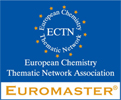Degree number of credits: 120
Compulsory credits: 65
Elective credits: 25
Final project: 30
Degree code: 2184
Years: 2
Teaching type: face-to-face
Knowledge branch: Sciences
Master degree website: http://tccm.qui.uam.es
Places available for new students: 9
Minimum number of enrolment credits per student: 36
Price per credit
[2023-2024 academic year]: 35,34 €
Management Centre: Faculty of Chemistry
Languages used in class: Spanish and English
Participating Universities: Autonomous University of Madrid, University of Cantabria, University of Extremadura, University of the Balearic Islands, University of Barcelona, Jaume I University, University of Murcia, University of Oviedo, University of País Vasco/Euskal Herriko Unibertsitatea, University of Salamanca, University of Santiago de Compostela, University of Valencia, University of Valladolid and University of Vigo
Academic Coordinating Committee: Ignacio Nilo Tuñón Gracía de Vicuña (Director)
Inmaculada García Cuesta
Remedios González Luque
Enrique Ortí Guillén
Pedro Manuel Viruela Martín
Martín Córdoba Martínez (PAS)
Academic, scientific or professional interest: Theoretical Chemistry and Computational Modelling (TCCM) play a key role in the development of modern chemistry, biochemistry, organic chemistry, physics and materials science. This role has been widely recognised by the international scientific community, resulting in the granting in 1998 of the Nobel Prize in Chemistry to John A. Pople, precisely for turning Computational Chemistry into a tool of predictive nature and therefore practically indispensable in any field of Chemistry and Physics. There is currently a growing number of applications of Chemistry in which the cooperation of Theoretical Chemistry and Computational Modelling is inevitable if we want to achieve a rationalisation of the observed reality. One paradigmatic example is mass spectrometry. Something similar can be said about the field of catalysis, in which molecular modelling plays an ever greater role. Moreover, in the important pharmaceutical industry, molecular modelling is a critical step in the process of generating a new drug. The synthesis of several variants of a possible active agent is much more expensive than the study of its possible activity by theoretical exploration based on Theoretical Chemistry and Computational Modelling methods. The situation is similar in regard to the synthesis of new materials. The most spectacular advances in the generation of various nanotubes, for example, came after they were modelled by computational means. Astrochemistry is another area in which the participation of Theoretical Chemistry and Computational Modelling is absolutely essential. The conditions found in interstellar space and in the atmospheres of the planets can be reproduced reliably by theoretical methods, while its reproducibility in the laboratory is much more difficult, if not impossible.
PhD programme linked to this Master’s programme: Theoretical Chemistry and Computational Modelling







